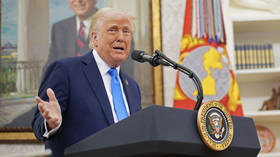Key African economy to abandon dollar in trade with BRICS – Reuters

Egypt is planning to shift away from the US dollar in mutual trade with several member states of the BRICS economic bloc, Egyptian Supply Minister Ali Moselhy said Monday, as quoted by Reuters.
According to Moselhy, Egypt is seeking to use local currencies to pay for its imports from India, China, and Russia – key members of the BRICS group, which also includes Brazil and South Africa.
“Nothing of the sort has been implemented but there are discussions so that we can trade in local currencies of countries like India, Russia or China,” Moselhy told the agency.
The BRICS group makes up 40% of the world’s population and almost a third of the global economy. The bloc members have recently outpaced the G7 in terms of economic growth.
In April, 19 countries expressed interest in joining BRICS, which is gearing up to hold its 15th annual summit in South Africa over August 22-24. The United Arab Emirates, Argentina, Algeria, Egypt, Bahrain, Indonesia, Saudi Arabia, and Iran are among the countries that have formally requested membership.
Egypt is currently trying to buoy its struggling economy, which has been dragged down by a notable decline in revenues from tourism and a surge in commodity prices. Geopolitical tensions have also reportedly prompted foreign investors to pull about $20 billion out of Egypt’s financial markets.
The nation has experienced a sharp surge in inflation over the last year following several waves of currency devaluations, a prolonged shortage of foreign currency, and continuing delays in procuring imports.
Egypt has recently agreed on a $3 billion deal with the International Monetary Fund (IMF), while its Gulf allies have also pledged to come to Cairo’s aid with billions in investments.
Bloomberg earlier reported, citing Moselhy, that India was providing Egypt with a credit line of unspecified size. However, the minister himself denied the claim in an interview with Reuters.
For more stories on economy & finance visit RT's business section














